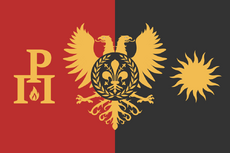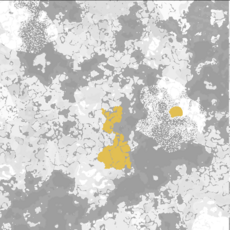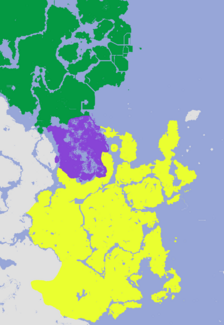Sanéa
| Commonwealth of Sanéa | ||||||||||||||||||||||||||||
|---|---|---|---|---|---|---|---|---|---|---|---|---|---|---|---|---|---|---|---|---|---|---|---|---|---|---|---|---|
 Flag of Sanéa Flag of Sanéa
| ||||||||||||||||||||||||||||
| ||||||||||||||||||||||||||||
 Map of claimable areas showing the territory of Sanéa in gold Map of claimable areas showing the territory of Sanéa in gold
| ||||||||||||||||||||||||||||
| Population | 18–20 citizens | |||||||||||||||||||||||||||
| Demonym | Sanéan | |||||||||||||||||||||||||||
| Location | East-central Cinder; the Sanéan Ocean | |||||||||||||||||||||||||||
| Capital | Sanafiorina | |||||||||||||||||||||||||||
| Imperator | Cyrus the Benevolent | |||||||||||||||||||||||||||
| Consul | Ivan Elvstrøm | |||||||||||||||||||||||||||
| Religion | Secular | |||||||||||||||||||||||||||
| Constitution of the Commonwealth of Sanéa | ||||||||||||||||||||||||||||
Sanéa (/sɑː.neɪ.ɑː/), officially the Commonwealth of Sanéa, is a Democratic Diarchy located in the near-spawn area and global south. It was founded on March 17th, 2024 upon the unification of the Duchy of Dirynum and the Principate of Messenia. The capital of Sanéa is Sanafiorina, located within the Government Capital Territory in the west of the Commonwealth. Sanéa borders Sprúsia in the east, the Yergolan Plains in the south-west, and the Tsagaan Khanate in the west.
Etymology
The Commonwealth is named after the Sanéan ocean, though the origins of the name of the sea are ambiguous. Modern scholars in the linguistic field generally agree that the name Sanéa comes from Sanéic, which in turn is theorised to mean 'Clean' or 'Clear' in old Proto-Danouvian. Similar names of the Sea come to us in the Mústyr language and in Danouvian. The name is also present in Ascëan, however this is probably a name that was adopted after the Ascëan migration into modern-day Sanéa.
History
Prelude
The lands that now make up the vast majority of Sanéa were in the past a part of Danouvia. It were the Danouvians that built up cities like Hanzia and Ístropolj, and it was the Danouvian collapse that laid the way for the eventual founding of Sanéa. On the fourth of January 2024, the remnants of the Danouvian government requested to be incorporated into Parakascëa. This request was granted and the two states formed the Principate of Messenia. A not too dissimilar story played out in parallel in the south. During the collapse of Danouvia, large parts of the Republic were sold to the Duchy of Dirynum. Which continued to administer these lands up into the unification of Sanéa. Dirynum followed in Danouvia's tradition of being a democratic monarchy, whilst Messenia leaned more authoritarian, but being less centralised than Dirynum.
Continued relations in the post-Danouvian lands
Both Dirynum and Messenia partook in numerous treaties with each other which strengthened bonds with the two states, culturally, too the nations stayed close to each other. Their shared Danouvian inheritance and Danouvian populations meant that there was always cultural exchange happening between the two neighbouring states. The collapse of Danouvia did of course mean that there was less cooperation within the ex-Danouvian lands than before the collapse, but the cooperation never ceased which meant that the populations of both Dirynum and Sanéa, rather Danouvian or not, still viewed each other as close kin.
Unification period (March 2024)
On the 12th of March 2024, Princeps Tarasius of Ephesus of Messenia was contacted by his Diryn counterpart Duke Cyrus the Benevolent about prospects of uniting the two brother states in a political union. The talks were conducted in secret, with no official declarations of intent to unite being publicly issued before the unification. The talks mainly focused on how the government would work, with little room being spared for cultural and economic integration of the two states, since it was assumed integration would naturally follow unification. After four days of hard and long negotiations, the First Constitution of Sanéa was agreed to on March 17th, with both the Diryn and Messenian governments agreeing to it without opposition. The announcement of the unification was issued on the following day. In the same week, Alaetia was chosen as the capital for the Commonwealth, and the national flag was adopted, both these things happened during the tenure of Luís Kazymir as Consul.
First Era of Sanéa (March-April 2024)
The Senate of Sanéa is central to its government, therefore the first act that Diarchs Tarasius of Ephesus and Cyrus the Benevolent did was calling elections for the Senate. The Election of the First Senate took place on March 21st and ran through to March 22nd. This Senate voted to elect Luís Kazymir, the last member of the Kazymir dynasty, as its Consul. The first three weeks post-unification were marked by both government initatives, as well as grassroots initiatives to bring the populations of Sanéa closer together. It was during the pre-election period that the Yergola war took place, and because of the lack of government the Commonwealth stayed neutral, though Sanéans did volunteer to fight on both sides.
After the appointment of Kazymir as Consul, the nation focused on building itself up internally. New laws were issued to encourage the creation of infrastructure, to boost the economy, and to increase Sanéa's international reach and influence. The nation used its status of internationally recognized great power to leverage influence in the south, specifically using its leverage to keep the northern nations out of the south. It upheld the Treaty of Korinthés which Messenia had signed with Cauldra to ensure that the Revolutionary Internationale would not expand south of Sanéa. Sanéa viewed itself as the keeper of the peace in the southern hemisphere. It was during these first weeks of Sanéa that the Liberal Party of Sanéa and the Reformists both had their starts as first informal, but later formal factions within the Senate. More projects were being finished, and more farms were being built, Sanéa was flourishing.
The trend of prosperity would be halted on the 19th of April, though. On that day, to mark the near-completion of the City of Alaetia, diarch Tarasius of Ephesus was giving a press conference about Sanéa and his future plans pertaining to Sanéa. Whilst answering questions from the crowd, Sol Aureus, an ex-Sanéan and professional hitman, assassinated the diarch. The Diarch would live until the next morning, passing away on the 20th of April 2024. His death is seen by many as the end of the first chapter of Sanéan history, with the author of the constitution and father of the nation dying and his title passing onto his selected heir, the Consul Luís Kazymir.
Second Era of Sanéa (April-)
With the ascension of Luís Kazymir as Diarch, he resigned his post as Consul, which he gave to Liberal Senator Ivan Elvstrøm. The death of Tarasius was met with international condolences from friend and foe alike. After the appointment of Elvstrøm as Consul the nation started to settle into its modern political order, competing with the HPE over influence in the south whilst generally having few relations with the north. This period has seen further development of places like Palermo, development throughout the Théma of Danouvia, and continued planning and early preparation work on the New Sanéan Capital Project. The Treaty of Korinthés was dissolved in this period. Not long after, following a court case elections were held on the 31st of May, this led to the ascension of ex-Arannan Bca as Consul of Sanéa.
The Bca administration
The Bca administration began following the elections of the 9th Rotation, and this period began with newfound hope, with the Senate voting in favour of expansions south, the democratisation of international relations, the termination of the IFERN contract, and the standardisation of the military, complete with the construction of a new arena. However, this period was also marred by the involvement of the neighbouring Lendisti Tribe, which had settled near Parakás and had been vassalised by the Sanéan state. Its leader, Aleksy Zerzan, would continue to involve himself in senatorial affairs, to the extent that he would be the subject of chagrin by senators. This period would soon be defined by further lack of communication between Cyrus the Benevolent and the rest of the government - as following the Firgardian crusade on Kothmire, Firgards demanded compensation in response to the Sanéan and Lendisti annexation of Kothmirian territory - ultimately leading to further splintering between the Diarchs and the Senate.
The second Ivan Elvstrøm administration
Geography

Broadly speaking the Commonwealth can be divided into three separate zones, the northern Mondego River Delta, the central Kotmirsk Swamps, and the Dyrin grasslands. Though the name doesn't suggest it, the Mondego River Delta is home to a number of mountains, mostly on the border with the Tsagaan Khanate, this zone is bounded in the south by the Kotmirsk Swamps, which as the name suggests is a swampland. It is in this swampland in which the Lendisti live. The Swamps are bounded by the Sanéan ocean and an unnamed mountain range. It is south of that mountain range where we find the biggest of the three geographic zones. The southern most zone - the Dyrin grasslands, generally are more mountainous and more sparsely populated that the northern two geographic zones. It stretches from the aforementioned mountain range down to the mountains of Danouvia-Scneimunt.
Government and Politics
Political System
Sanéa has been a Parliamentary Democracy since its founding. The Head of Government is the Consul, who only serves so long as they command a majority in the Senate. The Consul and Senate are both elected every two months, with the Citizenry of Sanéa voting in the Senate, who in turn is elected by the Senate. The Senate passes all internal legislation, say for the declaration of war, which is entrusted to the Council of Prefects. Though not explicitly outlined anywhere, politicians are expected to join a party before joining the Senate. This is usually the Liberal Party of Sanéa or the Reformist Party of Sanéa, with the Freedom and Solidarity Party being the third largest party as of the May 2024 Sanéan Senate Elections.
Administrative Subdivisions
The Commonwealth is divided into ten sub-regions, four Royal, Districts five Thémata and one Territory.
| Region | Largest City | Land Area (blocks square) | Population (June 2024) |
|---|---|---|---|
| Théma of Danouvia | Ístropolj | 573 248 | 2 |
| Théma of Mustyria | Kerstyl | 242 575 | 2 |
| Royal district of Palermo | Palermo | 240 818 | 6 |
| Territory of the Terramesso | N/A | 189 557 | 0 |
| Royal district of Parakéa | Alaetia | 158 521 | 0 |
| Royal district of Sol | Sol | 152 222 | 1 |
| Government City Area | Aquin West | 120 316 | 0 |
| Royal district of Akadéa | Korinthés | 114 785 | 1 |
| Théma of Rorantia | Rorantia | 94 137 | 1 |
| Théma of Fontaine | Fontaine | 67 459 | 2 |
